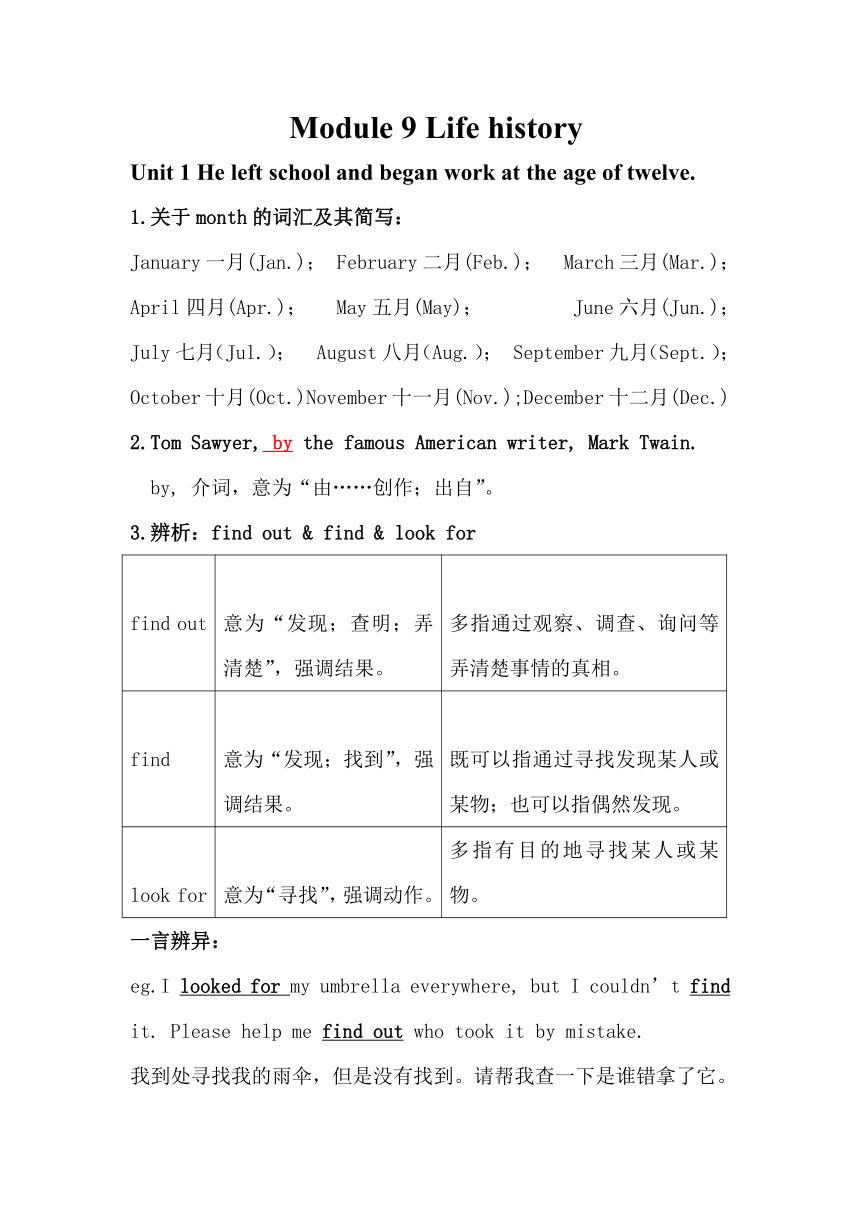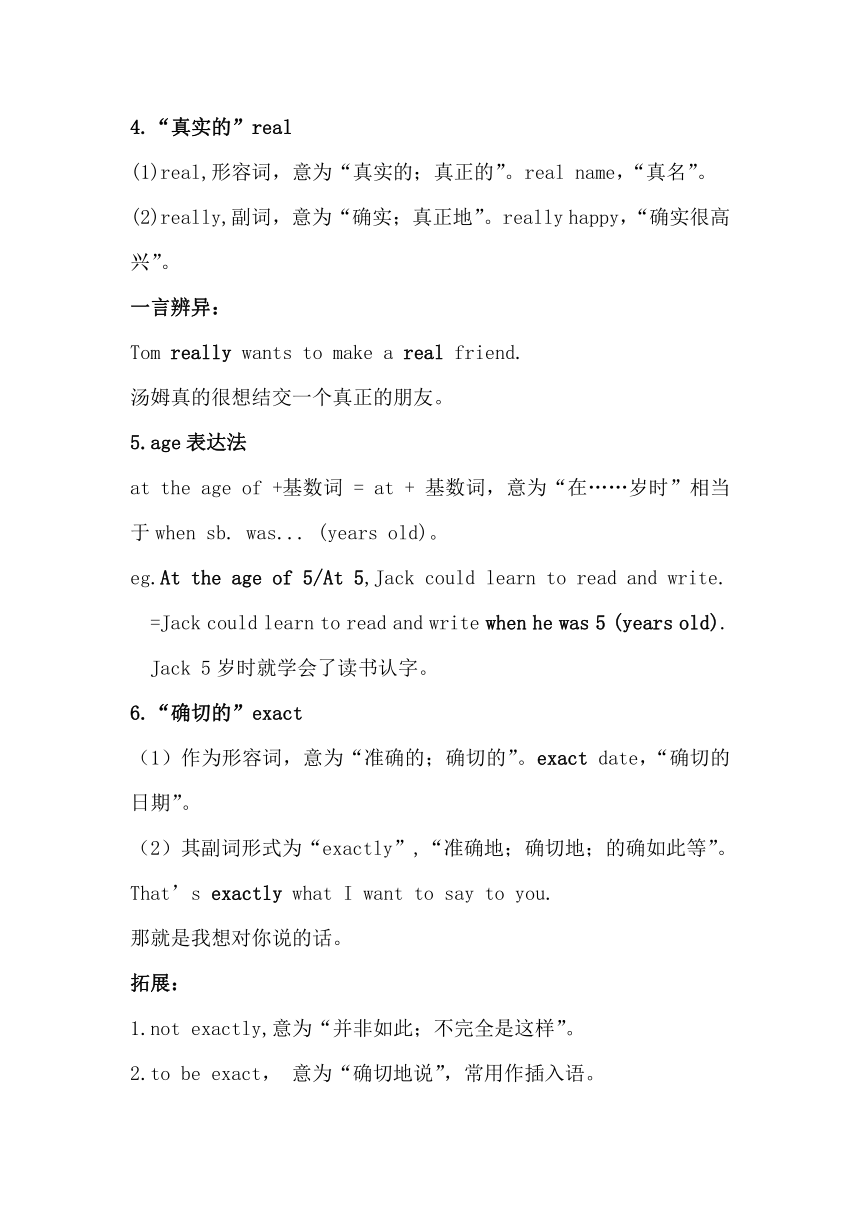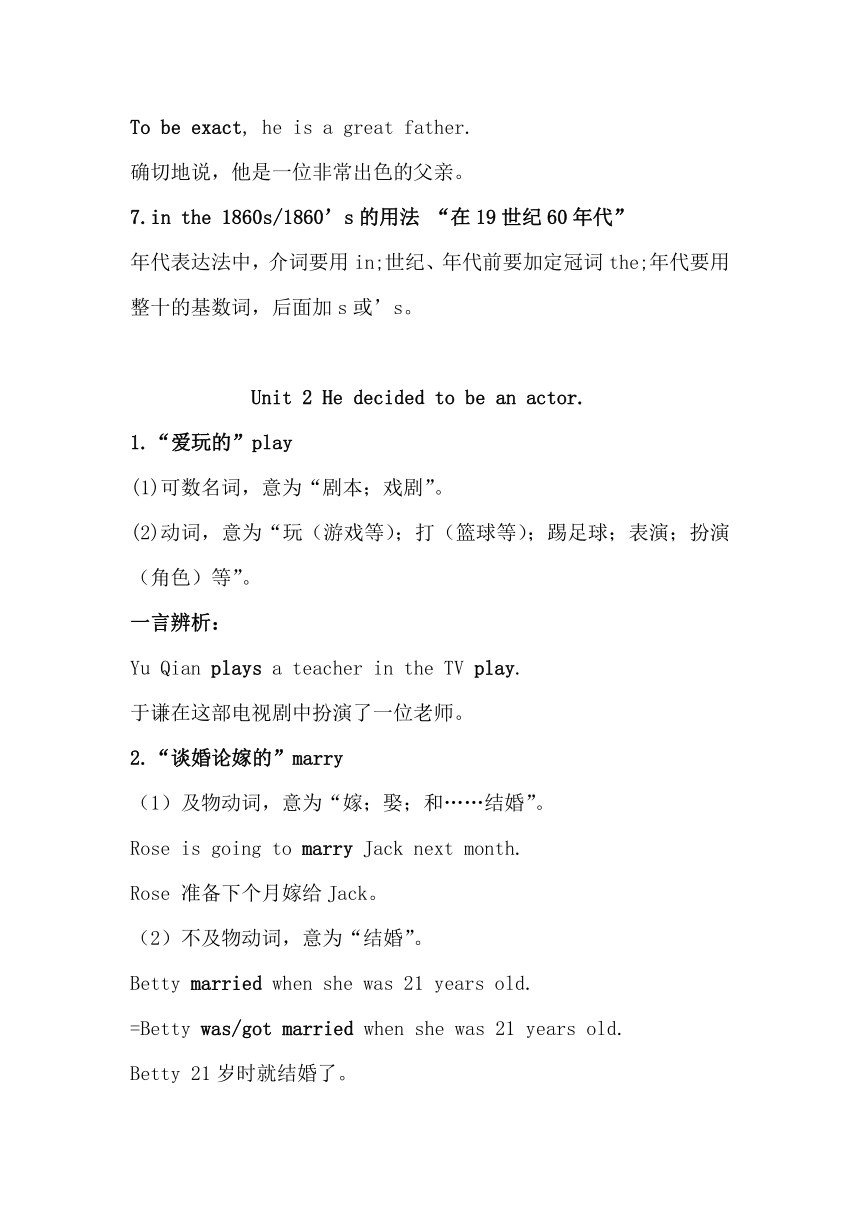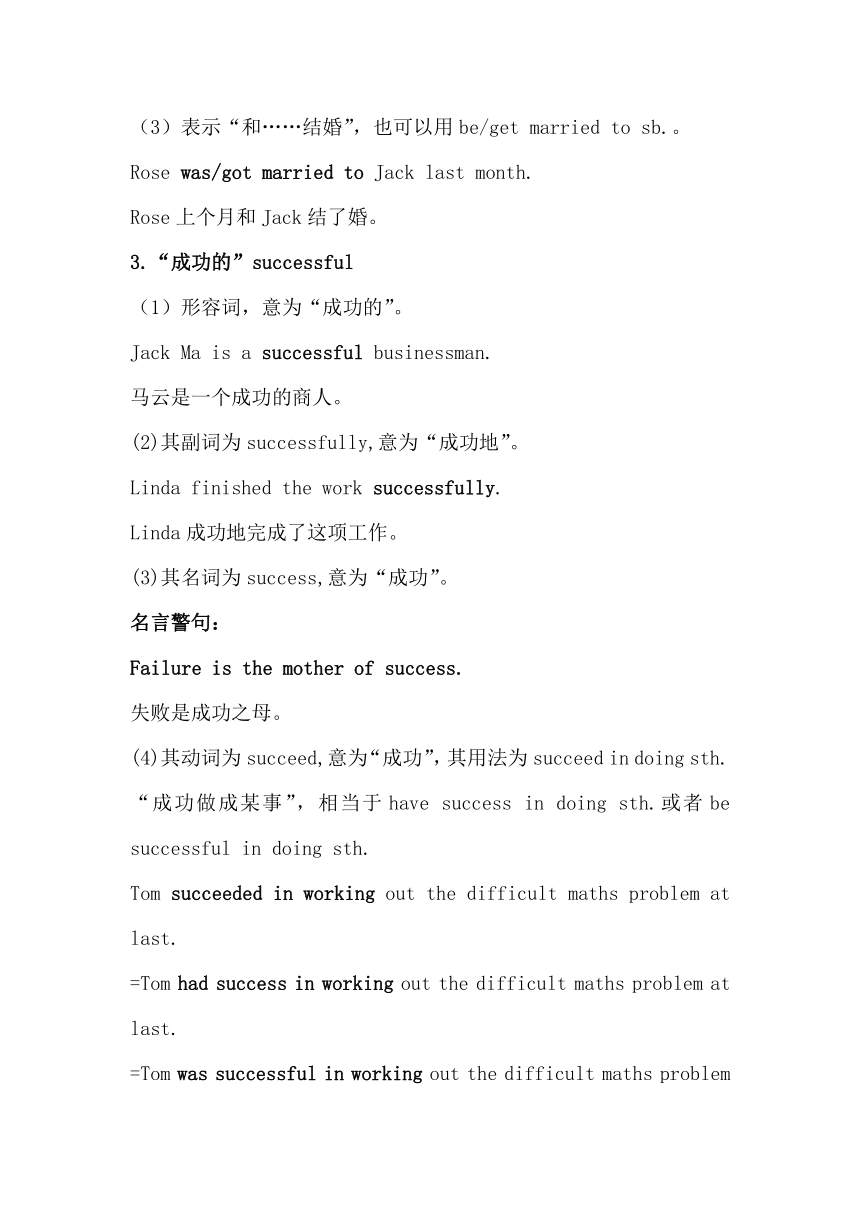外研版英语七年级下 Module 9 Life history 重要知识点
文档属性
| 名称 | 外研版英语七年级下 Module 9 Life history 重要知识点 |

|
|
| 格式 | zip | ||
| 文件大小 | 58.5KB | ||
| 资源类型 | 教案 | ||
| 版本资源 | 外研版 | ||
| 科目 | 英语 | ||
| 更新时间 | 2020-05-29 00:00:00 | ||
图片预览




文档简介
Module
9
Life
history
Unit
1
He
left
school
and
began
work
at
the
age
of
twelve.
1.关于month的词汇及其简写:
January一月(Jan.);
February二月(Feb.);
March三月(Mar.);
April四月(Apr.);
May五月(May);
June六月(Jun.);
July七月(Jul.);
August八月(Aug.);
September九月(Sept.);
October十月(Oct.)November十一月(Nov.);December十二月(Dec.)
2.Tom
Sawyer,
by
the
famous
American
writer,
Mark
Twain.
by,
介词,意为“由……创作;出自”。
3.辨析:find
out
&
find
&
look
for
find
out
意为“发现;查明;弄清楚”,强调结果。
多指通过观察、调查、询问等弄清楚事情的真相。
find
意为“发现;找到”,强调结果。
既可以指通过寻找发现某人或某物;也可以指偶然发现。
look
for
意为“寻找”,强调动作。
多指有目的地寻找某人或某物。
一言辨异:
eg.I
looked
for
my
umbrella
everywhere,
but
I
couldn’t
find
it.
Please
help
me
find
out
who
took
it
by
mistake.
我到处寻找我的雨伞,但是没有找到。请帮我查一下是谁错拿了它。
4.“真实的”real
(1)real,形容词,意为“真实的;真正的”。real
name,“真名”。
(2)really,副词,意为“确实;真正地”。really
happy,“确实很高兴”。
一言辨异:
Tom
really
wants
to
make
a
real
friend.
汤姆真的很想结交一个真正的朋友。
5.age表达法
at
the
age
of
+基数词
=
at
+
基数词,意为“在……岁时”相当于when
sb.
was...
(years
old)。
eg.At
the
age
of
5/At
5,Jack
could
learn
to
read
and
write.
=Jack
could
learn
to
read
and
write
when
he
was
5
(years
old).
Jack
5岁时就学会了读书认字。
6.“确切的”exact
(1)作为形容词,意为“准确的;确切的”。exact
date,“确切的日期”。
(2)其副词形式为“exactly”,“准确地;确切地;的确如此等”。
That’s
exactly
what
I
want
to
say
to
you.
那就是我想对你说的话。
拓展:
1.not
exactly,意为“并非如此;不完全是这样”。
2.to
be
exact,
意为“确切地说”,常用作插入语。
To
be
exact,
he
is
a
great
father.
确切地说,他是一位非常出色的父亲。
7.in
the
1860s/1860’s的用法
“在19世纪60年代”
年代表达法中,介词要用in;世纪、年代前要加定冠词the;年代要用整十的基数词,后面加s或’s。
Unit
2
He
decided
to
be
an
actor.
1.“爱玩的”play
(1)可数名词,意为“剧本;戏剧”。
(2)动词,意为“玩(游戏等);打(篮球等);踢足球;表演;扮演(角色)等”。
一言辨析:
Yu
Qian
plays
a
teacher
in
the
TV
play.
于谦在这部电视剧中扮演了一位老师。
2.“谈婚论嫁的”marry
(1)及物动词,意为“嫁;娶;和……结婚”。
Rose
is
going
to
marry
Jack
next
month.
Rose
准备下个月嫁给Jack。
(2)不及物动词,意为“结婚”。
Betty
married
when
she
was
21
years
old.
=Betty
was/got
married
when
she
was
21
years
old.
Betty
21岁时就结婚了。
(3)表示“和……结婚”,也可以用be/get
married
to
sb.。
Rose
was/got
married
to
Jack
last
month.
Rose上个月和Jack结了婚。
3.“成功的”successful
(1)形容词,意为“成功的”。
Jack
Ma
is
a
successful
businessman.
马云是一个成功的商人。
(2)其副词为successfully,意为“成功地”。
Linda
finished
the
work
successfully.
Linda成功地完成了这项工作。
(3)其名词为success,意为“成功”。
名言警句:
Failure
is
the
mother
of
success.
失败是成功之母。
(4)其动词为succeed,意为“成功”,其用法为succeed
in
doing
sth.“成功做成某事”,相当于have
success
in
doing
sth.或者be
successful
in
doing
sth.
Tom
succeeded
in
working
out
the
difficult
maths
problem
at
last.
=Tom
had
success
in
working
out
the
difficult
maths
problem
at
last.
=Tom
was
successful
in
working
out
the
difficult
maths
problem
at
last.
Tom最后终于成功地算出了那道数学难题。
4.“奄奄一息的”die
(1)不及物动词,意为“死;去世”。
David’s
grandfather
died
at
the
age
of
90.
David的爷爷90岁时去世了。
(2)其动词常见用法有:
①die
of,表示“由于衰老、疾病等自身内部的原因而导致的死亡”。
The
old
lady
died
of
lung
cancer.
那个老太太死于肺癌。
②die
from,表示“由于地震、交通事故等外部原因等造成的死亡”。
The
young
man
died
from
a
car
accident
last
week.
那个年轻人上周死于一场车祸。
(3)其形容词dead,意为“死亡的;不在的;去世的”。
Look!There
is
a
dead
fish
in
the
river.
看!河里有一条死鱼。(鱼已死了)
(4)其形容词dying,意为“垂死的;奄奄一息的”。
Look!The
little
fish
is
dying.
看!那条小鱼快死了。(鱼奄奄一息,还没死)
(5)其名词death,意为“死亡”。
The
death
of
the
pet
dog
made
the
little
girl
very
sad.
宠物狗的死亡让这个小女孩非常伤心。
考点拓展:
翻译:鲍勃的爷爷去世5年了。
(×)Bob’s
grandfather
died
for
5
years.
(√)Bob’s
grandfather
died
5
years
ago.
(√)Bob’s
grandfather
has
been
dead
for
5
years.
build用法
(1)及物动词,意为“建筑;建造”。
(2)其名词building,意为“建筑物”。
(3)其名词builder,意为
“建筑工人;建造者”。
一言辨析:
Look!Many
builders
are
working
hard
to
build
the
high
building
now.
看!很多建筑工人此刻正在建造那座高楼。
work用法
(1)作可数名词,意为“作品;著作”。
I
like
Lu
Xun’s
works
very
much.
我非常喜欢鲁迅先生的作品。
(2)作不可数名词,“工作”。
Kate
has
a
lot
of
work
to
do
this
weekend.
这个周末Kate有很多事情要做。
(3)作动词,意为“工作”。
We
work
from
Monday
to
Friday.
我们周一至周五上班。
(4)常见work短语
①work
on“从事于”
②be
out
of
work
“失业”
③work
for
“为……工作;为……效力
”
④work
out计算出;解出(数学题答案等)
名言警句:
All
work
and
no
play
makes
Jack
a
dull
boy.
只工作不玩耍,聪明孩子也变傻。
7.“丰富的”rich
(1)形容词,意为“有钱的;富有的等”,常用短语be
rich
in,意为“在……方面富有”。
The
young
man
is
a
very
rich
businessman.
那个年轻人是一个非常有钱的商人。
Shanxi
Province
is
rich
in
coal.
山西省煤炭资源丰富。
(2)“the+形容词”,表示“一类人”。the
rich,意为“有钱人;富人”,当其作主语时,谓语动词用复数形式。
The
rich
are
not
always
happy.
有钱人也并非总是很幸福。
8.around
the
world=all
over
the
world
“世界各地;环游世界”
9.fire的用法
(1)名词,意为“火;火灾”。
be
on
fire“着火”。
Boys,never
play
with
fire!
孩子们,千万不要玩火!
(2)动词,意为“开火;射击;发火;解雇等”。
He
was
fired
by
his
boss.
他被他的老板解雇了。
Unit
3
Language
in
use
1.辨析as
well
as
&
not
only...but
also...
as
well
as
“并且,还,既……又”,强调的是前面的部分。
He
speaks
English
as
well
as
Chinese.他既说汉语,又说英语。
not
only...but
also...
“不仅……而且”强调的是后面的部分。
He
speaks
not
only
Chinese
but
also
English.他不仅说汉语,而且还说英语。
注意:
(1)as
well
as连接主语时,其谓语动词的人称和数的形式应该和它之前的名词或者代词保持一致。
Jay
Chou
as
well
as
some
other
young
singers
is
popular
with
people.
周杰伦还有其他一些年轻的歌手深受人们的欢迎。
(2)not
only...but
also...连接并列主语时,其谓语动词的形式应该和but
also之后的代词或者人称保持一致。
Not
only
the
students
but
also
the
teacher
likes
playing
football.
学生和老师都喜欢踢足球。
2.be
worth
doing
sth.
“值得做某事”
This
book
is
worth
reading.
这本书值得一读。
名言警句:
One
today
is
worth
two
tomorrow.
一个今天抵得上两个明天。
9
Life
history
Unit
1
He
left
school
and
began
work
at
the
age
of
twelve.
1.关于month的词汇及其简写:
January一月(Jan.);
February二月(Feb.);
March三月(Mar.);
April四月(Apr.);
May五月(May);
June六月(Jun.);
July七月(Jul.);
August八月(Aug.);
September九月(Sept.);
October十月(Oct.)November十一月(Nov.);December十二月(Dec.)
2.Tom
Sawyer,
by
the
famous
American
writer,
Mark
Twain.
by,
介词,意为“由……创作;出自”。
3.辨析:find
out
&
find
&
look
for
find
out
意为“发现;查明;弄清楚”,强调结果。
多指通过观察、调查、询问等弄清楚事情的真相。
find
意为“发现;找到”,强调结果。
既可以指通过寻找发现某人或某物;也可以指偶然发现。
look
for
意为“寻找”,强调动作。
多指有目的地寻找某人或某物。
一言辨异:
eg.I
looked
for
my
umbrella
everywhere,
but
I
couldn’t
find
it.
Please
help
me
find
out
who
took
it
by
mistake.
我到处寻找我的雨伞,但是没有找到。请帮我查一下是谁错拿了它。
4.“真实的”real
(1)real,形容词,意为“真实的;真正的”。real
name,“真名”。
(2)really,副词,意为“确实;真正地”。really
happy,“确实很高兴”。
一言辨异:
Tom
really
wants
to
make
a
real
friend.
汤姆真的很想结交一个真正的朋友。
5.age表达法
at
the
age
of
+基数词
=
at
+
基数词,意为“在……岁时”相当于when
sb.
was...
(years
old)。
eg.At
the
age
of
5/At
5,Jack
could
learn
to
read
and
write.
=Jack
could
learn
to
read
and
write
when
he
was
5
(years
old).
Jack
5岁时就学会了读书认字。
6.“确切的”exact
(1)作为形容词,意为“准确的;确切的”。exact
date,“确切的日期”。
(2)其副词形式为“exactly”,“准确地;确切地;的确如此等”。
That’s
exactly
what
I
want
to
say
to
you.
那就是我想对你说的话。
拓展:
1.not
exactly,意为“并非如此;不完全是这样”。
2.to
be
exact,
意为“确切地说”,常用作插入语。
To
be
exact,
he
is
a
great
father.
确切地说,他是一位非常出色的父亲。
7.in
the
1860s/1860’s的用法
“在19世纪60年代”
年代表达法中,介词要用in;世纪、年代前要加定冠词the;年代要用整十的基数词,后面加s或’s。
Unit
2
He
decided
to
be
an
actor.
1.“爱玩的”play
(1)可数名词,意为“剧本;戏剧”。
(2)动词,意为“玩(游戏等);打(篮球等);踢足球;表演;扮演(角色)等”。
一言辨析:
Yu
Qian
plays
a
teacher
in
the
TV
play.
于谦在这部电视剧中扮演了一位老师。
2.“谈婚论嫁的”marry
(1)及物动词,意为“嫁;娶;和……结婚”。
Rose
is
going
to
marry
Jack
next
month.
Rose
准备下个月嫁给Jack。
(2)不及物动词,意为“结婚”。
Betty
married
when
she
was
21
years
old.
=Betty
was/got
married
when
she
was
21
years
old.
Betty
21岁时就结婚了。
(3)表示“和……结婚”,也可以用be/get
married
to
sb.。
Rose
was/got
married
to
Jack
last
month.
Rose上个月和Jack结了婚。
3.“成功的”successful
(1)形容词,意为“成功的”。
Jack
Ma
is
a
successful
businessman.
马云是一个成功的商人。
(2)其副词为successfully,意为“成功地”。
Linda
finished
the
work
successfully.
Linda成功地完成了这项工作。
(3)其名词为success,意为“成功”。
名言警句:
Failure
is
the
mother
of
success.
失败是成功之母。
(4)其动词为succeed,意为“成功”,其用法为succeed
in
doing
sth.“成功做成某事”,相当于have
success
in
doing
sth.或者be
successful
in
doing
sth.
Tom
succeeded
in
working
out
the
difficult
maths
problem
at
last.
=Tom
had
success
in
working
out
the
difficult
maths
problem
at
last.
=Tom
was
successful
in
working
out
the
difficult
maths
problem
at
last.
Tom最后终于成功地算出了那道数学难题。
4.“奄奄一息的”die
(1)不及物动词,意为“死;去世”。
David’s
grandfather
died
at
the
age
of
90.
David的爷爷90岁时去世了。
(2)其动词常见用法有:
①die
of,表示“由于衰老、疾病等自身内部的原因而导致的死亡”。
The
old
lady
died
of
lung
cancer.
那个老太太死于肺癌。
②die
from,表示“由于地震、交通事故等外部原因等造成的死亡”。
The
young
man
died
from
a
car
accident
last
week.
那个年轻人上周死于一场车祸。
(3)其形容词dead,意为“死亡的;不在的;去世的”。
Look!There
is
a
dead
fish
in
the
river.
看!河里有一条死鱼。(鱼已死了)
(4)其形容词dying,意为“垂死的;奄奄一息的”。
Look!The
little
fish
is
dying.
看!那条小鱼快死了。(鱼奄奄一息,还没死)
(5)其名词death,意为“死亡”。
The
death
of
the
pet
dog
made
the
little
girl
very
sad.
宠物狗的死亡让这个小女孩非常伤心。
考点拓展:
翻译:鲍勃的爷爷去世5年了。
(×)Bob’s
grandfather
died
for
5
years.
(√)Bob’s
grandfather
died
5
years
ago.
(√)Bob’s
grandfather
has
been
dead
for
5
years.
build用法
(1)及物动词,意为“建筑;建造”。
(2)其名词building,意为“建筑物”。
(3)其名词builder,意为
“建筑工人;建造者”。
一言辨析:
Look!Many
builders
are
working
hard
to
build
the
high
building
now.
看!很多建筑工人此刻正在建造那座高楼。
work用法
(1)作可数名词,意为“作品;著作”。
I
like
Lu
Xun’s
works
very
much.
我非常喜欢鲁迅先生的作品。
(2)作不可数名词,“工作”。
Kate
has
a
lot
of
work
to
do
this
weekend.
这个周末Kate有很多事情要做。
(3)作动词,意为“工作”。
We
work
from
Monday
to
Friday.
我们周一至周五上班。
(4)常见work短语
①work
on“从事于”
②be
out
of
work
“失业”
③work
for
“为……工作;为……效力
”
④work
out计算出;解出(数学题答案等)
名言警句:
All
work
and
no
play
makes
Jack
a
dull
boy.
只工作不玩耍,聪明孩子也变傻。
7.“丰富的”rich
(1)形容词,意为“有钱的;富有的等”,常用短语be
rich
in,意为“在……方面富有”。
The
young
man
is
a
very
rich
businessman.
那个年轻人是一个非常有钱的商人。
Shanxi
Province
is
rich
in
coal.
山西省煤炭资源丰富。
(2)“the+形容词”,表示“一类人”。the
rich,意为“有钱人;富人”,当其作主语时,谓语动词用复数形式。
The
rich
are
not
always
happy.
有钱人也并非总是很幸福。
8.around
the
world=all
over
the
world
“世界各地;环游世界”
9.fire的用法
(1)名词,意为“火;火灾”。
be
on
fire“着火”。
Boys,never
play
with
fire!
孩子们,千万不要玩火!
(2)动词,意为“开火;射击;发火;解雇等”。
He
was
fired
by
his
boss.
他被他的老板解雇了。
Unit
3
Language
in
use
1.辨析as
well
as
&
not
only...but
also...
as
well
as
“并且,还,既……又”,强调的是前面的部分。
He
speaks
English
as
well
as
Chinese.他既说汉语,又说英语。
not
only...but
also...
“不仅……而且”强调的是后面的部分。
He
speaks
not
only
Chinese
but
also
English.他不仅说汉语,而且还说英语。
注意:
(1)as
well
as连接主语时,其谓语动词的人称和数的形式应该和它之前的名词或者代词保持一致。
Jay
Chou
as
well
as
some
other
young
singers
is
popular
with
people.
周杰伦还有其他一些年轻的歌手深受人们的欢迎。
(2)not
only...but
also...连接并列主语时,其谓语动词的形式应该和but
also之后的代词或者人称保持一致。
Not
only
the
students
but
also
the
teacher
likes
playing
football.
学生和老师都喜欢踢足球。
2.be
worth
doing
sth.
“值得做某事”
This
book
is
worth
reading.
这本书值得一读。
名言警句:
One
today
is
worth
two
tomorrow.
一个今天抵得上两个明天。
同课章节目录
- Module 1 Lost and found
- Unit 1 Whose bag is this?
- Unit 2 Are they yours?
- Unit 3 Language in use
- Module 2 What can you do ?
- Unit 1 I can play the piano
- Unit 2 I can run really fast
- Unit 3 Language in use
- Module 3 Making plans
- Unit 1 What are you going to do at the weekends?
- Unit 2 We're going to cheer the players.
- Unit 3 Language in use
- Module 4 Life in the future
- Unit 1 Everyone will study at home
- Unit 2 Every family will have a small plane.
- Unit 3 Language in use
- Module 5 Shopping
- Unit 1 What can I do for you?
- Unit 2 You can buy everything on the Internet
- Unit 3 Language in use
- Module 6 Around town
- Unit 1 Could you tell me how to get to the Nationa
- Unit 2 The London Eye is on your right.
- Unit 3 Language in use
- Revision module A
- Module 7 My past life
- Unit 1 I was born in a small village.
- Unit 2 I was born in Quincy.
- Unit 3 Language in use
- Module 8 Story time
- Unit 1 Once upon a time….
- Unit 2 Goldilocks hurried out of the house.
- Unit 3 Language in use
- Module 9 Life history
- Unit 1 He left school and began work at the age of
- Unit 2 He decided to be an actor.
- Unit 3 Language in use
- Module 10 A holiday journey
- Unit 1 What did you do?
- Unit 2 This morning we took a walk.
- Unit 3 Language in use
- Module 11 Body language
- Unit 1 They touch noses!
- Unit 2 Here are some ways to welcome them.
- Unit 3 Language in use
- Module 12 Western music
- Unit 1 It's so beautiful!
- Unit 2 Vienna is the centre of European classical
- Unit 3 Language in use
- Revision module B
